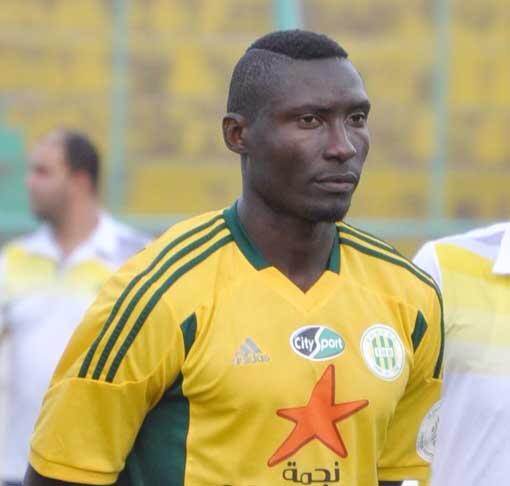
Albert Ebossé, the Algerian league’s top striker last season, was killed by a stone thrown from the stands during a match on Saturday in Tizi Ouzou. It was hurled by someone in a section of the stadium occupied by supporters of his own team, JSK.
The Algerian authorities have opened an investigation on this senseless killing. Meanwhile, the Tizi Ouzou stadium is closed until further notice.
Born in 1989 in Douala, Cameroon, Ebossé stood out on the pitch for his physical size, scoring ability, and unbreakable spirit. In a series of tweets, the Algerian football analyst Mezahi Maher described him as “one of the best I’ve seen in the Algerian league. [He] Seemed invincible against the nastiest defenders. That air of indestructibility further adds to the shock.”
Widely respected by teammates and the media in Algeria, Ebossé embodied the hemle (Bassa for “pride”) so revered in Douala, as Ntone Ndjabe explained in a terrific World Cup preview of the Cameroon squad published in the Financial Times.
When, during a match in Sétif, spectators spewed monkey chants at him, Maher recalled, Ebossé remained composed and focused. Later in the match he soared above the defenders to score on a powerful header. Ebossé celebrated by doing a “monkey dance” for the crowd. Hemle.
His 17 goals in 2013-14 attracted the attention of several European clubs. However, with a daughter born just one week ago and a year left on his JSK contract, Ebossé decided to stay put: “Tizi Ouzou is special. Here I feel as if I’m with my own family in Douala.”
It was a member of his “family” who killed him.
Tag: violence
Death Match for the Egyptian Revolution?
Egypt’s worst-ever soccer disaster: at least 73 people died at a match in Port Said on Wednesday. “This tragedy is not simply a story of a match gone horribly awry,” writes James Dorsey at The Turbulent World of Middle East Soccer blog. “It will have important and wide-ranging political ramifications.” (Full post here.) The causes for the tragedy are unclear.
According to the New York Times, “Politicians, fans and Egyptian soccer officials all faulted the police as failing to conduct the standard gate searches to prevent fans from bringing knives, clubs or other weapons into the match.” Did the ultras — hard-core supporters — of home side El Masry and Cairo heavyweights Al Ahly walk into a trap?
Tensions between the ultras were high in the build up to the match. Taunts and scuffles in the terraces halted the game early on. El Masry won 3-1, but as the final whistle blew fans invaded the pitch and chased the Al Ahly players. Egyptian television footage (see above) shows undermanned law enforcement standing passively during the chaos.
“People here are dying, and no one is doing a thing. It’s like a war,” said Al Ahly star midfielder Mohamed Aboutrika; “Is life this cheap?” He then promptly announced his retirement from the professional game.
“The ultras whether they walked into a trap or initiated the Port Said violence have no doubt again dug themselves into a hole,” Dorsey observes (full post here). “This time round it will be a lot tougher to dig themselves out. They have played into the hands of the military and the police in dealing a lethal blow [to] contentious street politics as opposed to electoral politics and the horse trading associated with it.”
We at Footballiscominghome extend our condolences to the families of the victims.
***
Additional coverage of the Port Said disaster and its aftermath here.
This just in from Alex Galarza: NPR’s Andy Carvin is curating tweets live from Cairo @acarvin. Osama Diab at The Guardian also has a worthwhile story.
Read David Goldblatt’s “Egypt’s Political Football” here.
Further Reading: Paul Darby, Martin Johnes, Gavin Mellor, eds., Soccer and Disaster: International Perspectives (London: Routledge, 2005).